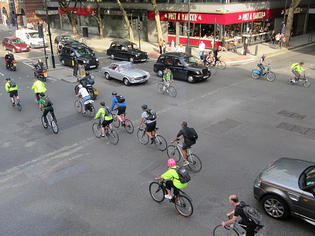The positive impact of commuting by bicycle
 Sat, August 27, 2011
Sat, August 27, 2011  The London School of Economics recently published a report on the economic impact cycling has in Britain.
The London School of Economics recently published a report on the economic impact cycling has in Britain.
The report states that in 2010 cycling contributed 2.9 billion British Pounds to the economy.
Which would be 4.7 billion US Dollars; note that is billion with a “B.”
This figure is not just new bicycle sales; it includes income made by people working in bicycle manufacturing and retail. It also estimates for example that people who commute to work by bike are healthier and therefore take less sick days off work. There are many other factors taken into account that contribute to the 2.9 billion figure; you can read the full report here.
One piece of information I gleaned from this report (On page 16.) is that between 10,000 and 15,000 people commute into London every day by bicycle. That figure is up 52% since 2007, and the forecast is for that number to quadruple by 2025.
I wonder if the average motorist driving into London and complains about the increased number of cyclist he encounters, realizes what a huge positive impact that number of regular bicycle commuters has on his daily drive.
As most people drive solo in a car, 10,000 bikes means 10,000 less cars on the road on any given day; 10,000 bike commuters is the low side of the estimate.
A car needs a lot of space to operate, not just due to its increased physical size but due to the space required between each car which is far greater than the vehicle itself. Most car safety advocates agree that a car needs 2 seconds time lapse between vehicles in order to maintain a safe stopping distance.
At 20 mph. (29.33 feet per second.) a car should have 29.33 x 2 = 58.66 feet of space between it and the car in front. Add to that the length of the vehicle; let’s assume it is an average compact at about 15 feet.
That is 73.66 feet (22.45 meters.) of road space needed for every car; so take 10,000 cars off the road and you free up a whopping 139.5 miles of roadway. (Using Wolfram Alpha to calculate.)
The reason I chose 20 mph as the car's speed was because I figured this might be the average speed of a commute into to London during rush hour with the resulting stop and go traffic. A car would take up less space while at a standstill but would require more than 73.66 feet if going at more than 20 mph.
On the other hand, a bicycle takes up little or no space because the average car can pass a cyclist within the same lane. If a motorist has to slow to safely pass a cyclist, rather than become annoyed at the cyclist’s presence, he should realize that the cyclist represents one less car ahead of him that he would most likely not be able to pass.
Think of the impact that 10,000 per day less cars on the road has on the wear and tear of the road’s surface; a bicycle puts little or no wear on the road. Motorists who complain about the increased number of cyclists on the road, and complain about the cost of installing bike lanes, etc., are really not looking at the whole picture.
They should instead thank the person who decides to ride his/her bike to work, and in doing so takes one more car off the road. London is only one city in the world where this is happing.
I have recently been critical of cyclists in New York for running red lights, etc. However, bicyle commuting into New York City every day, will be having a similar positive impact as London, with the resuliting reductiion of cars.
Footnote: The picture of a London street at the top of this piece came from this article. (Worth a read.) It is interesting to note there are twice the number of bicycles in the picture than cars.























Reader Comments (13)
There has to be more to the economics of cycle commuting than that. Since we all know it's far cheaper to buy, operate and maintain a bike than it is a car, wouldn't driving instead of cycling "contribute" a whole lot more to the economy? But then, where would you find room for all the extra cars? "Contributing to the economy" is not really what normal people strive for. The real advantage to cycle commuting is fitness, less congestion and, of course, it's a lot cheaper than driving.
I don't think I'm mistaken in identifying that particular intersection as the junction of Gray's Inn Road with Theobalds Road. Gray's Inn Road, by co-incidence, has since 1948 been home to the deservedly famous Condor Cycles.
Amazing increase in cycling commuters. I wondered what the increase is since the 70"s? I used to commute into the city from west London everyday back then and saw hardly any others bikes.
""Contributing to the economy" is not really what normal people strive for. "
Yes, but it is what the people who provide the money in the first place strive for. Or, more correctly, that the economy contributes to them. The fact that I save thousands a year on insurance premiums by cycling is not looked upon in a positive light by insurance bankers.
Arguments about "The Economy(tm)" are aimed at the people who need to sign off on infrastructure.
The problem I see is that all the 'suits' would get wet! Maybe a machine could be made like the one for screening at the airport, You step in and hot air dries your suit and you! Talking about getting wet Dave, Are you dried out yet?
20mph for a London commute may be a bit optomistic. My old commute was from Ealing to Kew and I recall beating car traffic from the Uxbridge Road to the Chiswick roundabout WALKING. Good grief I don't know anyone in London would bother with a car save for out of town excursions and raiding Safeways.
When I ride my bike I'm contributing to my economy. At $.50 per mile to use my vehicle the cost fo my commute, to and from, is $15 per day. Now if I cut down to 1 vehicle for the family we will save about $500 per month. Now there are costs for cycling but I can't see them as going over 10 cents per mile. I do also reduce the local income from fuel taxes but I also decrease the wear and tear n the roads by more.
There will be some losers is you switch to cycling or transit commuting but in general it will be a benefit to society.
I don't really understand the economics of contributing more wealth into the economy, however I would love to be able to bike to work. Not really a possibility for most of us in Socal. I would save $1000 or so a month if I could get rid of my car between tolls, gas, insurance, etc. Maybe the extra $ saved is what goes back into the economy.
Jason Reeves
Joint Health Author
joint juice reviews
Exactly Jason and it is nearly impossible to place a value on civility and greater social interaction. The positive impact of supporting-designing-incentivizing the public to cycle over using impersonal-anonymous autos-SUVs is undervalued.
Saving $500/month for 30 years and invested for retirement means financial independence when you may need it the most. In addition, how valuable is good health?
I commute by bike because I like riding.
The rest of the benefits are just a bonus.
And I look really good in lycra. (Okay, I made that last part up.)
Not to mention the consolidation of parking. You can typically park a dozen plus bikes in the same space it takes to park a single car.
I have seen statistics that of the money spent on cars only about about 16% stays in the local economy, the rest leaves. I am sure a cyclist shopping locally leaves a whole lot more than that, not to mention having more disposable income.
Aaron
You bring up a good point when you state that drivers should realize that each cyclist represents one less car ahead of them that they would most likely not be able to pass. Aaron also makes a good point in his comment when he mentions the small amount of space it takes to park a bike versus the amount of space it takes to park a car. Overall, choosing to ride a bike has positive effects for both the cyclist and the drivers around him or her.
I'm in the US and really enjoy passing BIG FAT people sitting in their SUV's(or take your pick) on my bike. It's like a never ending list of good things that are going on that folks in cars are simply missing out. I could read off the list, but you know what i mean. My whole family caught a fever, caugh/cold, and were just a mess for a couple weeks this past winter.... I just kept on riding to work. Have to think riding is the reason I avoided that illness without flinching.